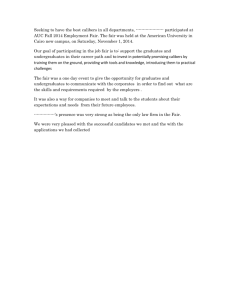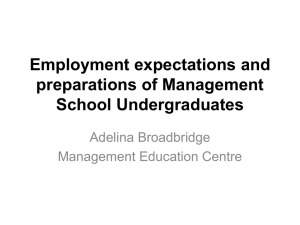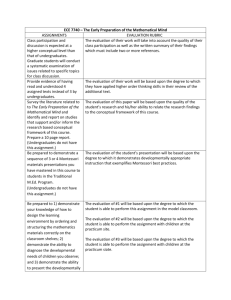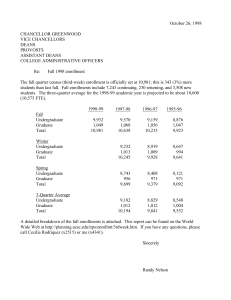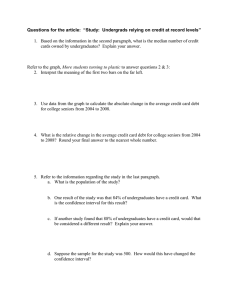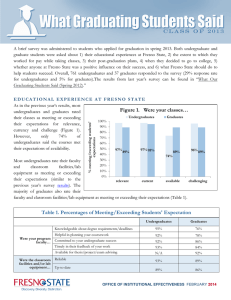What Graduating Students Said Class of 2012
advertisement
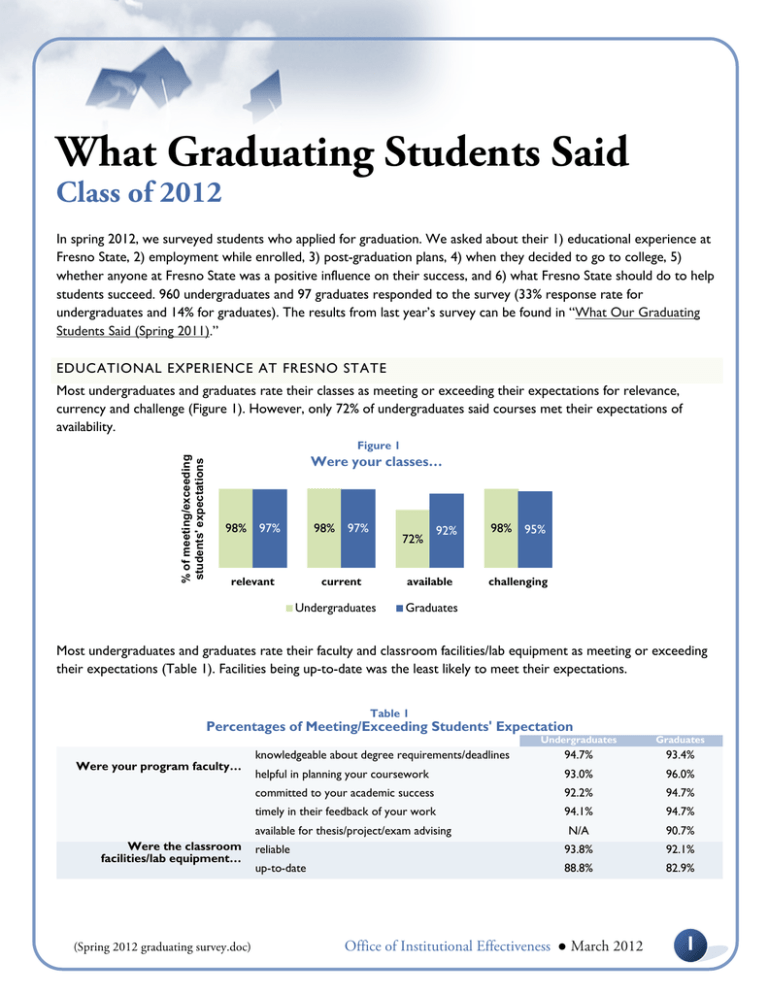
What Graduating Students Said Class of 2012 In spring 2012, we surveyed students who applied for graduation. We asked about their 1) educational experience at Fresno State, 2) employment while enrolled, 3) post-graduation plans, 4) when they decided to go to college, 5) whether anyone at Fresno State was a positive influence on their success, and 6) what Fresno State should do to help students succeed. 960 undergraduates and 97 graduates responded to the survey (33% response rate for undergraduates and 14% for graduates). The results from last year’s survey can be found in “What Our Graduating Students Said (Spring 2011).” EDUCATIONAL EXPERIENCE AT FRESNO STATE Most undergraduates and graduates rate their classes as meeting or exceeding their expectations for relevance, currency and challenge (Figure 1). However, only 72% of undergraduates said courses met their expectations of availability. % of meeting/exceeding students' expectations Figure 1 Were your classes… 98% 98% 97% relevant 97% 72% current 92% available Undergraduates 98% 95% challenging Graduates Most undergraduates and graduates rate their faculty and classroom facilities/lab equipment as meeting or exceeding their expectations (Table 1). Facilities being up-to-date was the least likely to meet their expectations. Table 1 Percentages of Meeting/Exceeding Students' Expectation Were your program faculty… Undergraduates Graduates knowledgeable about degree requirements/deadlines 94.7% 93.4% helpful in planning your coursework 93.0% 96.0% committed to your academic success 92.2% 94.7% timely in their feedback of your work 94.1% 94.7% N/A 90.7% reliable 93.8% 92.1% up-to-date 88.8% 82.9% available for thesis/project/exam advising Were the classroom facilities/lab equipment… (Spring 2012 graduating survey.doc) Office of Institutional Effectiveness March 2012 1 Figure 2 The educational experience at Fresno State met or exceeded most students’ expectations (Figure 2). While the majority would recommend Fresno State to others, this percentage is considerably lower than ratings of quality and value, particularly for graduate students. Overall Educational Experience A good value in relation to cost of degree (% of meeting/exceeding expectations) 89% 87% 93% A high quality academic experience (% of meeting/exceeding expectations) 88% 79% Recommend Fresno State to others (% of YES) 71% Undergraduates Graduates OFF-CAMPUS EMPLOYMENT WHILE ENROLLED (UNDERGRADUATES ONLY) Figure 3 Percentage of UGs working 40 hours or more per week Figure 4 Employment through undergraduate career 100% 68% 80% 60% 25% 15% 53% 40% 88% 87% 71% 68% Junior Senior 78% 61% 20% 0% Spring 2011 Spring 2012 Freshman Sophomore Spring 2011 Spring 2012 The majority of students (74%) were employed off-campus while enrolled. Slightly fewer were employed than last year’s graduating class (74% vs. 77%), but a larger percentage of those who were employed worked more hours (Figure 3) and throughout their undergraduate career rather than just as juniors and seniors (Figure 4). PRINCIPAL ACTIVITY AFTER GRADUATION For undergraduates, the principal activity after graduation is similar to the results in last year’s survey with a small shift from employment to furthering their education. 53% of undergraduates plan to work and 37% will attend graduate or professional school (compared to 55% and 35%, respectively, in last year’s survey). 93% of graduating graduate students plan to work. WHEN STUDENTS DECIDED TO GO TO COLLEGE (UNDERGRADUATES ONLY) The result is similar to that in last year’s survey. 71% of respondents said they always knew they would attend college. 15% decided during high school. 9% decided as an adult. 6% decided during grade school or middle school. (Spring 2012 graduating survey.doc) Office of Institutional Effectiveness March 2012 2 THE MOST NOTABLE ASPECT OF THEIR UNDERGRADUATE/GRADUATE EDUCATION Faculty members are the most notable aspect for both undergraduates and graduates. 65 students (45 out of 99 undergraduates and 20 out of 42 graduates) cited their faculty/teachers as knowledgeable, experienced and passionate about the subject they were teaching and dedicated to helping students. Though far fewer students consistently noted other things, the literature has shown the following to be influential on students’ success. For example, enriching educational experiences (EEEs) at Fresno State are the next most common response (16 undergraduates and 10 graduates). EEEs they cited were joining student organizations, course projects, research, internships, study aboard, service learning and other extracurricular activities. 18 undergraduates and 3 graduates said the most notable aspect of their education was gaining knowledge/skills. WHAT FRESNO STATE CAN DO TO HELP STUDENTS SUCCEED 96 undergraduates responded to this question. The three top issues are classes, tuition/cost and advising. 28 undergraduates said enhance class availability, flexibility or variety to help them enroll and graduate on time. 23 undergraduates said reduce tuition fees or educational cost. Some said that this would help them spend less time working and more time focusing on their education. 15 undergraduates cited the need for more and better advising, such as advising for transfer/upper division students, advising on their educational plan toward a degree, major change, and preparation for graduate school/future career. 31 graduates also responded to this question. While tuition fees and class issues remain on the list of the major issues, the top response among graduate students is communication or advising. 12 graduates cited the need for better communication to keep them informed and on track, such as emailing students about deadlines for things outside of the program, having an outline at the beginning of the program stating all classes that graduate students will need to take, advising all graduate students about the Maximum Unit Petition, more advising on graduation application, and more career services set up specifically for graduate students. WHY STUDENTS DECIDED TO GO TO GRADUATE SCHOOL (GRADUATES ONLY) Career consideration is the dominant reason to go to graduate school, which is cited by 31 out of 48 respondents. The reasons stated include starting a new career, having more career options, meeting job requirements, becoming more competitive/viable, for promotion and pay raise, or to do better work with new knowledge/skills. 11 graduates cited personal interests as their major reason to go to graduate school, such as to keep learning, for self-challenge/realization or for family (“set an example for my children”). Three graduates said other reasons, such as “I was offered a scholarship that more or less paid for it,” “because I couldn't get a job in this economy,” and “my district put together a cohort.” (Spring 2012 graduating survey.doc) Office of Institutional Effectiveness March 2012 3
